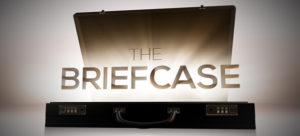
By Nicole Walther
Recently CBS premiered a new show called „The Briefcase.“ If you are not familiar with it, the premise is that two middle-class American families, who are experiencing financial setbacks, are presented with a suitcase of $101,000. They then have to make the decision whether to keep all the money, give all of it or part of the money to another family in need. During the process of the show the family learns more about the hardship and financial struggle of those strangers.
Within days of the premiere, the show became one of the most controversial summer shows. America responded with comments on websites that were both emotionally charged and spirited. According to a recent New York Post article the show was referred to as “Sophie’s Choice’ for the financially strapped,” “a rigged morality tale,” and “altruism pornography.”
“The Worst Reality Show Ever”
The Time called it “the worst Reality Show Ever” and female-skewed website Jezebel.com writes that the show is a “shitshow of bad taste, manipulation, and voyeurism.” On message boards people compare the show to “The Hunger Games” some question the morality of the shows creator and anyone involved. As I read some of the comments, I noticed that many messages took issue with the term ‘poor.’ The show’s creator/ producer David Broome actually tries to correct those using the term, clarifying that the participants are pulled from America’s middle-class, not poverty stricken Americans. (NY Post.) But what if the participants actually were ‘poor.’ Why would that make a difference?
I kept reading the comments and was wondering why people are so emotionally charged about this show? We all know reality television often mixes real-life issues and entertainment. Whoever is looking for a moral high-ground when tuning into a reality show would be better advised to spend their time volunteering at the closest homeless shelter. Just consider reality shows like “Hoarders” or “Intervention.” The shows are among some of the most successful and long-running shows and are based on people with real and often serious mental health or substance abuse problems. But “The Briefcase” hits a nerve with viewers because of their own economic hardship. Granted, many comments on boards were made before people even saw a single episode. However, the truth is that the commentators who did watch the show were still very emotional and subjective in their criticism. Many of us are living paycheck to paycheck. We struggle to pay all the bills and just when we are done paying for the month, next month’s rent is due again.

Self-Observation
Money is the cause of major stress in families, relationships and individuals. There are a lot of different ways to stress about money. It can be due to the lack of money or because you don’t feel comfortable with the amount of savings you were able to create. Maybe you have money and you are worried about loosing it all, or you contemplate if you are giving enough to good causes.
I recently found myself incapable of pulling the trigger on purchasing a flight ticket. For five months I have kept an eye on flight tickets to visit my family. But every time I want to go through with the purchase, a little voice in my head keeps saying “No, don’t do it yet. You might get them cheaper if you just wait another month.” I have yet to buy those tickets to fly home! I started thinking about my spending (or lack of spending) habits. I absolutely refuse to buy clothes at full price. TJ Maxx and Marshalls are on the top of my clothing store list for the two times a year I even go clothes shopping. I once got a pair of very cool GUESS cargo pants at the mall because someone gave me a gift certificate. I still wonder how much cheaper I could have gotten them at a discount store and even though I didn’t spend the money, I felt bad for “spending” it for years. When my car needs gas and I pull out of a gas station just to drive by another one that offered the gas for $0.02 less, I have an intense emotional response to the money I ‘wasted.’
Watching “The Briefcase” I found myself most intrigued by how different people are in their reactions and in their struggle to make that decision whether or not, or how much to share with someone else. I was especially taken back by a woman in the second episode. She had to live with several children in a very small home, in a different state than her husband, and had considerable debt including bankruptcy, yet when presented with the $101,000 and the choice whether to keep it or give it away, she immediately decided that she needed to give all the money away! She said it just ‘wasn’t right” to keep any of it knowing that another family could need it. Huh? But she and her family needed it! Her husband kept pointing out their own struggles and his desire to reunite their family, which they could do if they kept a good part of the money. He was open to giving some money away, showing that he is an empathetic human being, but he also made it clear that he wanted to put their family first.

Finding the reason of your money reactions
I absolutely related to the husband’s reaction, but was completely at a loss to understand hers. I know people can be selfless, people will do incredible things to help others, but why would she not even consider keeping some of the money so that she could be with her husband and children? She went as far as telling him “I hate you” when his choice (they each get one turn to decide how much money to keep until the final decision they make together) was to keep $80,000 and to give the other family $20,000. I was completely baffled by her response. Sure, one can be compassionate, but if you filed for bankruptcy, have outstanding medical bills, live in a 2-bedroom trailer with three kids, one of them special needs, on the other side of the country away from your husband, would you not recognize that YOU are the family in need?
Over the course of working with Marilyn O’Malley, I learned that childhood programming is responsible for the way we feel about money. Most often, money (having it or not having it) is what’s holding us back from living a fulfilling life. The good news is that childhood programming about money can be reversed. During this 2nd episode of “The Briefcase” I saw firsthand how people will sabotage themselves from living a fulfilled live. The woman’s childhood programming about money was so deep, that when given a large sum of money, her first instinct was to give it away. Marilyn did an interesting podcast not too long ago talking about what keeps people from having (more) money. But her Huffington Post article on “Why your debt was created as a child…” will be a real gamer changer for you. If you haven’t read it yet, click on the link as soon as you are done with this one.
If you are curious about your childhood programming concerning money, I highly recommend you take Marilyn’s Personal Money Mapping session. In the session, Marilyn will help you go deep to the root of your reactions to money. Once you understand how your current actions for or against money were ingrained in you as a child, you will not only feel a relief, but you will feel empowered, because you can finally do something about it and turn your money habits into something that is positive and make you happy!
Marilyn is currently running a 50% off special ($50) on the money mapping session. E-mail her to get the link for the discount. It will be an eye-opener!
I definitely revisited several of Marilyn’s podcasts, blogs and notes from my sessions with her after watching this new show. I hope you will, too.
And if you missed the first few episodes of the show, watch them online.



